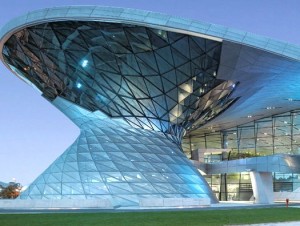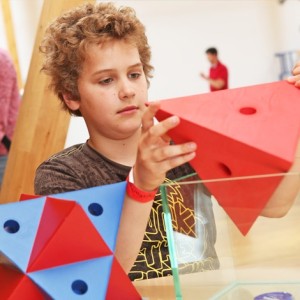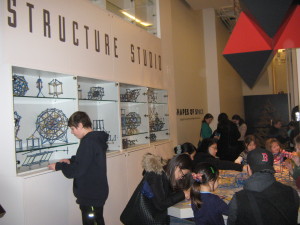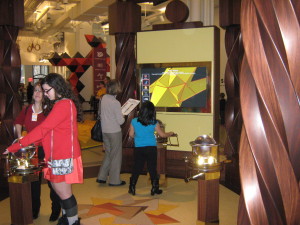What is a Mathematics Discovery Centre?

We were inspired by successful mathematics discovery centres around the world, particularly Mathematikum in Germany, and MoMath in the USA.
Our aim is to:
- create an outstanding visitor attraction (approx. 3000msq ) that presents maths as playful, thought-provoking, exciting, relevant and accessible
- welcome 150,000+ visitors each year (children, families, school groups, students and other adults) from diverse economic, social and cultural backgrounds – inspiring them to discover, explore and enjoy mathematical thinking and ideas
- build young people’s skills, confidence and interest in mathematics and their desire to learn more – including among those who face the greatest barriers to engaging with maths
- explode negative perceptions of mathematics – among young people and the parents, carers and teachers who influence their career choices
- secure a stable and financially resilient future for the new attraction, with no long-term reliance on public subsidy
View our short video making the case for the Discovery Centre.
What will be in the Mathematics Discovery Centre
We established MathsCity in 2021 and this gives the flavour of what the future National Mathematics Discovery Centre will be like, which can be seen on this visitor made clip.
The Discovery Centre will excite the imagination by encouraging interaction with mathematical objects, simulations and images. These will stimulate mathematical thinking in unusual ways that make it possible to appreciate the beauty, ingenuity, applicability and importance of Mathematics. It will include fun problems and puzzles to engage its full range of visitors.
The Discovery Centre will be divided into Zones. Some Zones will focus on a powerful mathematical idea (e.g. Problem Solving, Numbers Large and Small, Shape, Chance and Risk, ….)
Others will focus on areas of application (e.g. Design and Engineering, Code Breaking, Digitial and AI, Medical Research, Planet Earth, Outer Space ..). There will be an under 8’s zone and a temporary exhibit zone.
 Each Zone will contain a mixture of interactive hands-on and electronic exhibits and displays. We seek to actively engage children and adults alike.
Each Zone will contain a mixture of interactive hands-on and electronic exhibits and displays. We seek to actively engage children and adults alike.
The People Gallery will provide profiles and stories about the remarkable people, both men and women, who have over the years contributed to the astonishing development of mathematics. We will also include some of the people of today who use mathematics in their everyday jobs and in research.
A meeting place
 The Discovery Centre will host mathematics festivals, lectures, workshops, and shows. It will store mobile shows which can travel round other museums and discovery centres. It will be a fun place for people of all ages, novices and professionals, to meet, to discuss mathematical ideas over a cup of coffee or snack and a place to browse and buy books and artifacts related to mathematics. We woudl seek to be a preferred venue for major mathematical events, including the presentation of Awards for outstanding mathematical achievement and film screenings of events such as the Fields Medal ceremony (the mathematical equivalent of the Nobel Prize presentation).
The Discovery Centre will host mathematics festivals, lectures, workshops, and shows. It will store mobile shows which can travel round other museums and discovery centres. It will be a fun place for people of all ages, novices and professionals, to meet, to discuss mathematical ideas over a cup of coffee or snack and a place to browse and buy books and artifacts related to mathematics. We woudl seek to be a preferred venue for major mathematical events, including the presentation of Awards for outstanding mathematical achievement and film screenings of events such as the Fields Medal ceremony (the mathematical equivalent of the Nobel Prize presentation).
An extensive outreach programme will be aimed at schools and other groups.
Locating the Mathematics Discovery Centre
The Discovery Centre will be aimed especially at school parties and family groups, but it is intended to include material suited to visitors of all ages, background and abilities, including tourists and mathematics professionals. No matter what your age, or background, there will be lots of things in the Discovery Centre to excite you!
For all these reasons it is essential that the Mathematics Discovery Centre will be sited in a major UK city with easy access for large numbers of visitors. At the moment we are pursuing the possibility of a venue in Leeds or London.
“Mathematicians are like Frenchmen: whatever you say to them they translate into their own language and forthwith it is something different.” – Johann Wolfgang von Goethe

